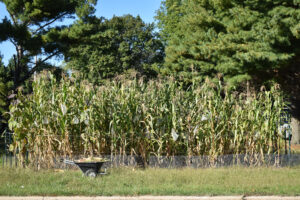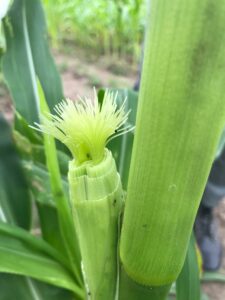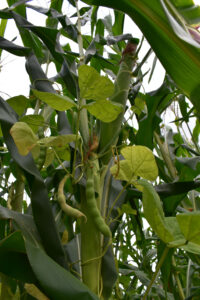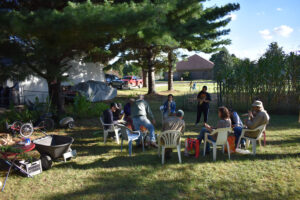Project Overview
Information Products
Commodities
- Agronomic: corn
Practices
- Animal Production: genetics
- Crop Production: crop improvement and selection, seed saving
- Education and Training: farmer to farmer, mentoring, on-farm/ranch research, workshop
- Energy: energy conservation/efficiency
- Farm Business Management: cooperatives, land access
- Pest Management: biological control, field monitoring/scouting
- Production Systems: organic agriculture, permaculture
- Soil Management: composting, organic matter, soil analysis, soil chemistry, soil quality/health
- Sustainable Communities: analysis of personal/family life, community development, local and regional food systems, quality of life, urban agriculture
Summary:
 Group gathers around a ground offering at a Seed Blessing Ceremony at one of the research farms. Photo by Gerardo Morales[/caption] [caption id="attachment_970208" align="alignnone" width="300"]
Group gathers around a ground offering at a Seed Blessing Ceremony at one of the research farms. Photo by Gerardo Morales[/caption] [caption id="attachment_970208" align="alignnone" width="300"] Bofo maize ready at harvest time in a backyard plot. Photo by Gerardo Morales[/caption] [caption id="attachment_970205" align="alignnone" width="300"]
Bofo maize ready at harvest time in a backyard plot. Photo by Gerardo Morales[/caption] [caption id="attachment_970205" align="alignnone" width="300"] Group gathering for grinding masa and making tortillas. Photo by Zuleyja Prieto[/caption] [caption id="attachment_970203" align="alignnone" width="300"]
Group gathering for grinding masa and making tortillas. Photo by Zuleyja Prieto[/caption] [caption id="attachment_970203" align="alignnone" width="300"] Planting Benugzenug (Walpole Island White Flour Corn) at Bushelcraft Farm. Photo by Zuleyja Prieto[/caption] [caption id="attachment_970204" align="alignnone" width="225"]
Planting Benugzenug (Walpole Island White Flour Corn) at Bushelcraft Farm. Photo by Zuleyja Prieto[/caption] [caption id="attachment_970204" align="alignnone" width="225"] Benugzenug silks ready for hand pollinating. Photo by Jon Zirkle.[/caption]
Benugzenug silks ready for hand pollinating. Photo by Jon Zirkle.[/caption]
Many folks want to grow small-scale heritage corn at home, though knowledge of how to do so successfully is lacking, as is cultural awareness about corn diversity. With much of northern Indiana in close proximity to commercial cornfields with GMO traits, growing small-scale GMO-free heritage corn for human consumption and seed saving is challenging. Corn pollen, although heavy, can travel up more than 1640 feet, and can be found more than a half a mile away from its source plant (Agriculture and Natural Resources, March 15, 2016). This distance can certainly vary depending on wind, humidity and temperature. Since commercial corn pollen travels far, is backyard heritage corn GMO contaminated? Should we test? In 2021 and 2022, five+ farmers grew plots of heritage corn (varieties seed saved from 2019, 2020) for processing, eating, seed saving, and sharing, with attempts to reduce GMO contamination by planting date (late planting) and with hand pollination techniques to improve purity. Considering commercial corn's pollination window in Indiana is between late June to mid-July, the group selected either very early maturing heritage corn; late planting (late June) of regular season varieties; and early planting of very late maturing heritage corn. Corn from three of the farms underwent GMO testing in 2021 and 2022. A database was created to keep track of varieties; planting, tassel, and harvest dates; as well as challenges and observations.
Qualitative GMO testing of three varieties in 2021 resulted in "not detected". In 2022, the same approach to avoid GMO contamination was pursued (planting date, hand pollinating), and the result for Qualitative GMO testing for two varieties was 0.06% for open pollinated Avati Moroti Mita; and <0.05% for Open pollinated Bofo. Both results were well below de 0.9% standard for the Non-GMO Project. The hand pollinated Avati corn, our control piece in the research, received a "not detected" qualitative result for the second year in a row.
Throughout the 2021 and 2022 seasons, growers gathered as families and shared the cultural value, preparation, planting techniques, pest control, challenges of cultivating backyard heritage corn, and its uses for food sustenance, by organizing and teaching 20 ceremonies/trainings/field sessions/workshops and three larger community events. The group was diverse in age, including children ages 7-11; youth interns 16-18; as well as college students; and adults up to 78 years old. Digital resources (presentations and social media posts) document learning and are shared publicly to enhance community learning. Corn seed was shared with new seed stewards, and a community network of heritage corn stewards and enthusiasts was supported.
Growers now feel confident that taking into consideration the planting date and time to tassel of heritage corn to avoid the pollination window with commercial GMO corn, is effective in keeping sacred heritage corn seed free from GMOs, within the backyard plots. Growers now have more context of the cultural value of corn as a staple crop. They have been reassured in their agroecological practices, have learned new ways to embrace climate change and pest damage, and consequently improved their yield and product quality.
Project objectives:
-

Bofo heritage corn grown in milpa system in a research plot. 
Group husking and collaborative learning about true to type qualities. Photo by Gerardo Morales
Grow backyard heritage corn in Northern Indiana with sustainable practices, collecting data from experiments with planting dates and hand pollination to avoid GMO contamination from commercial corn. - Identify the resources needed for raising heritage corn at the backyard scale, for the sustenance of households, seed saving and sharing.
- Educate our community of the biological, cultural, agronomic, economic, and health implications of heritage corn production at the homestead level through family-to-family, farmer-to-farmer, and farmer-to-community educational trainings and events, social media and video documentaries.
- https://youtu.be/Zdkv4j4twGs